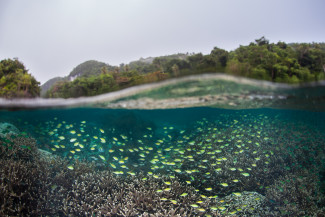
Johns Hopkins UniversityEst. 1876
America’s First Research University
Wounded Planet: How Declining Biodiversity Endangers Health And How Bioethics Can Help

The biodiversity crisis is worse than climate change. This was the conclusion of leading international experts, meeting in Paris last week to assess the status of ecosystems. More than 1 million species will be annihilated in the next decades. Plants, insects and other creatures will be irreversibly lost. Growing food in certain areas such as the American Midwest will no longer be possible. More than 43% of Americans are now living in places where air is seriously polluted. According to the WHO 75% of the world population are already breathing unsafe air. At least 2 million people use contaminated drinking water. At the same time, the impending catastrophe is denied. Especially the American news media are sleepwalking toward disaster.
This book argues that it is high time to wake up. Not merely because the survival of humanity is at stake but because our current health is at stake. Whatever one thinks about climate change, degradation of biodiversity is a serious threat to planetary health and requires a radical change in ethical thinking. Biological diversity is an essential condition for human flourishing. Without a healthy planet, human beings cannot be healthy. For clean air, safe water, adequate nutrition, provision of drugs, and protection from infectious diseases we depend on biodiversity. However, ethical debate continues to focus on individual perspectives. This book provides numerous examples that today healthcare and medicine are changing into a broader perspective that includes the social and environmental circumstances in which individuals are situated. For this reason, a different approach of bioethics is needed. The new field of global bioethics provides ethical principles that transcend the limited vision of mainstream bioethics. It introduces a normative horizon in which other perspectives become visible such as justice, equality, vulnerability, human rights, and solidarity.

I wrote Wounded Planet because there is copious and substantial evidence nowadays that loss of biodiversity has an extremely negative impact on planetary health. Surprisingly, this evidence is not taken into account in discussions and policies regarding the ethical dimensions of health care. These debates are primarily focused on the benefits and harms of indiv idual patient care. People expect miracle drugs that can cure diseases. They are not aware that drugs are increasingly difficult to develop because biodiversity as their natural resource is disappearing. Life-saving drugs such as antibiotics are becoming ineffective since they are extensively used in agriculture and animal farming. For the first time in years, life expectancy in the U.S. is declining. Such evidence should make us anxious about our health. Biodiversity degradation does not longer impact future generations but has deleterious effects on current existence.
The take away from this book is that a different ethical approach is urgently needed to drive alternative political, economical and social policies. Bioethical discussion today can no longer be imagined without considering environmental impacts. A global bioethics approach is inescapable. Notions of commons, vulnerability and justice should be used as ethical tools to broaden the discourse on health. Another conclusion is that bioethics should be more than theoretical discourse. The book explores how global bioethics can be applied in practical settings around the world. It provides examples for new governance, framing, awareness-raising, advocacy, and grassroots activities. The book concludes that global bioethics supports health professionals, policy-makers, and citizens of the world in their efforts to enhance planetary health. The Green New Deal and Extinction Rebellion should be fortified by the new discourse of global bioethics.
Henk A.M.J. ten Have, MD, PhD, is a professor in the Center for Health Care Ethics at Duquesne University. He is the author of Global Bioethics: An Introduction and Vulnerability: Challenging Bioethics.


